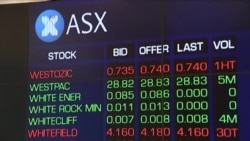ດັດຊະນີຮຸ້ນ Nikkei ຂອງຍີ່ປຸ່ນ ໄດ້ຮັບຄວາມເສຍຫາຍຢ່າງ
ໜັກໃນ ລະຫວ່າງການຊື້ຂາຍໃນວັນອັງຄານມື້ນີ້ ຊຶ່ງເປັນເປັນ
ຮ່ອງຮອຍທີ່ສະແດງໃຫ້ເຫັນວ່າ ການຂາຍຮຸ້ນອອກໃນວັນຈັນ
ວານນີ້ ໃນຢູໂຣບ ແລະ ສະຫະລັດ ຍັງຈະມີຜົນຕໍ່ອອກໄປອີກ
ມື້ໜຶ່ງຢູ່ໃນທົ່ວໂລກ.
ດັດຊະນີຮຸ້ນ Nikkei ໄດ້ສູນເສຍ 918 ພອຍທ໌ ຫລື 5.40 ເປີເຊັນ ໃນຕອນປິດໂດຍມີ
ລາຄາຢູ່ 16,085 ພອຍທ໌. ນີ້ເປັນການຕົກລາຄາ ຫຼາຍທີ່ສຸດຂອງດັດຊະນີຮຸ້ນ Nikkei
ນັບແຕ່ເດືອນມິຖຸນາ ປີ 2013 ເປັນຕົ້ນມາ ໃນຂະນະທີ່ບັນດານັກລົງທຶນພາກັນຂາຍ
ຮຸ້ນອອກ ແລະໄປຊື້ພັນທະບັດຂອງລັດຖະບານ ຍ້ອນມີຄວາມຢ້ານກົວກ່ຽວກັບການ
ແຂງຄ່າຂຶ້ນຂອງເງິນເຢນ ຊຶ່ງຈະເຮັດໃຫ້ການສົ່ງອອກ ຂອງຍີ່ປຸ່ນ ມີລາຄາແພງຂື້ນ ຢູ່
ໃນທົ່ວຕະຫລາດໂລກ ພ້ອມທັງການຊັກຊ້າລົງກ່ຽວ ກັບການເຕີບໂຕຂອງເສດຖະກິດ
ໃນຈີນ ແລະການຕົກລາຄາແບບບໍ່ມີທີ່ສິ້ນສຸດຂອງນໍ້າມັນຢູ່ໃນທົ່ວໂລກ. ໃນຂະນະດຽວ
ກັນລາຄາພັນທະບັດ ລະຍະ 10 ຂອງລັດຖະບານຍີ່ຢຸ່ນ ໄດ້ຕົກຕໍ່າລົງກວ່າສູນເປັນເທື່ອ
ທຳອິດແບບບໍ່ເຄີຍມີມາກ່ອນ.
ດັດຊະນີທີ່ສຳຄັນຂອງອອສເຕຣຍເລຍ S&P/ASX 200 ກໍໄດ້ຕົກລາ ຄາເກືອບສາມ
ເປີເຊັນໃນຕອນປິດຕະຫລາດມີລາຄາຢູ່ 4,832 ໂດລາ.
ດັດຊະນີໃນເອເຊຍອຶ່ນໆ ໄດ້ປິດການຊື້ຂາຍໃນວັນອັງຄານມື້ນີ້ ຍ້ອນ ພັກສະຫລອງບຸນ
ປີໃໝ່ ທາງຈັນທະຄະຕິ ຮວມທັງດັດຊະນີຮຸ້ນ ທີ່ນະ ຄອນຊຽງ Shangahi, Hong Kong
ແລະ Seoul.
ວັນຈັນວານນີ້ ເປັນມື້ທີ່ສ້າງຄວາມເສຍຫາຍຮ້າຍແຮງໃຫ້ແກ່ບັນດານັກລົງທຶນ ໂດຍທີ່
ດັດຊະນີໃນນະຄອນ Paris, Frankfurt ແລະ London ຕ່າງກໍຕົກຫລາຍເຖິງສາມເປີ
ເຊັນ. ຢູ່ນະຄອນ New York ດັດຊະນີ NASDAQ ຕົກລາຄາ 1.6 ເປີເຊັນ ດັດຊະນີ
S&P 500 ໄດ້ຕົກລົງ 1.4 ເປີເຊັນ ແລະດັດຊະນີ Dow ຕົກລາຄາ 1.1 ເປີເຊັນ.
Japan's Nikkei index sustained major losses during Tuesday's trading session, a sign that Monday's sell-off in Europe and the U.S. will extend for another day across the globe.
The Nikkei lost a staggering 918 points, or 5.40 percent, at the closing bell, finishing at 16,085 points. It was the Nikkei's biggest drop since June 2013, as investors fled stocks into safe assets as government bonds over fears of a rising yen -- which makes Japanese exports more expensive on the global markets -- plus slowing economic growth in China and a never-ending drop in global oil prices. Meanwhile, yields on the benchmark 10-year Japanese government bond dropped below zero for the first-time ever.
Australia's main S&P/ASX 200 index dropped almost three percent to close at 4,832.
Many other Asian indexes were closed Tuesday for the Lunar New Year, including Shanghai, Hong Kong and Seoul.
Monday was a rough day for investors, with the benchmark indexes in Paris, Frankfurt and London all falling as much as three percent. In New York, the NASDAQ slid 1.6 percent, the S&P 500 dropped 1.4 percent, and the Dow lost 1.1 percent.
The current state of the U.S. economy, as well as the outlook for interest rate increases, growth and unemployment, are on the agenda Wednesday and Thursday when Federal Reserve Chair Janet Yellen testifies before key congressional committees.
Treasury Secretary Jack Lew also will speak to members of Congress about President Barack Obama's budget and other economic issues this week.
In the meantime, investors will be assessing new data on retail sales, unemployment insurance claims and consumer sentiment.






